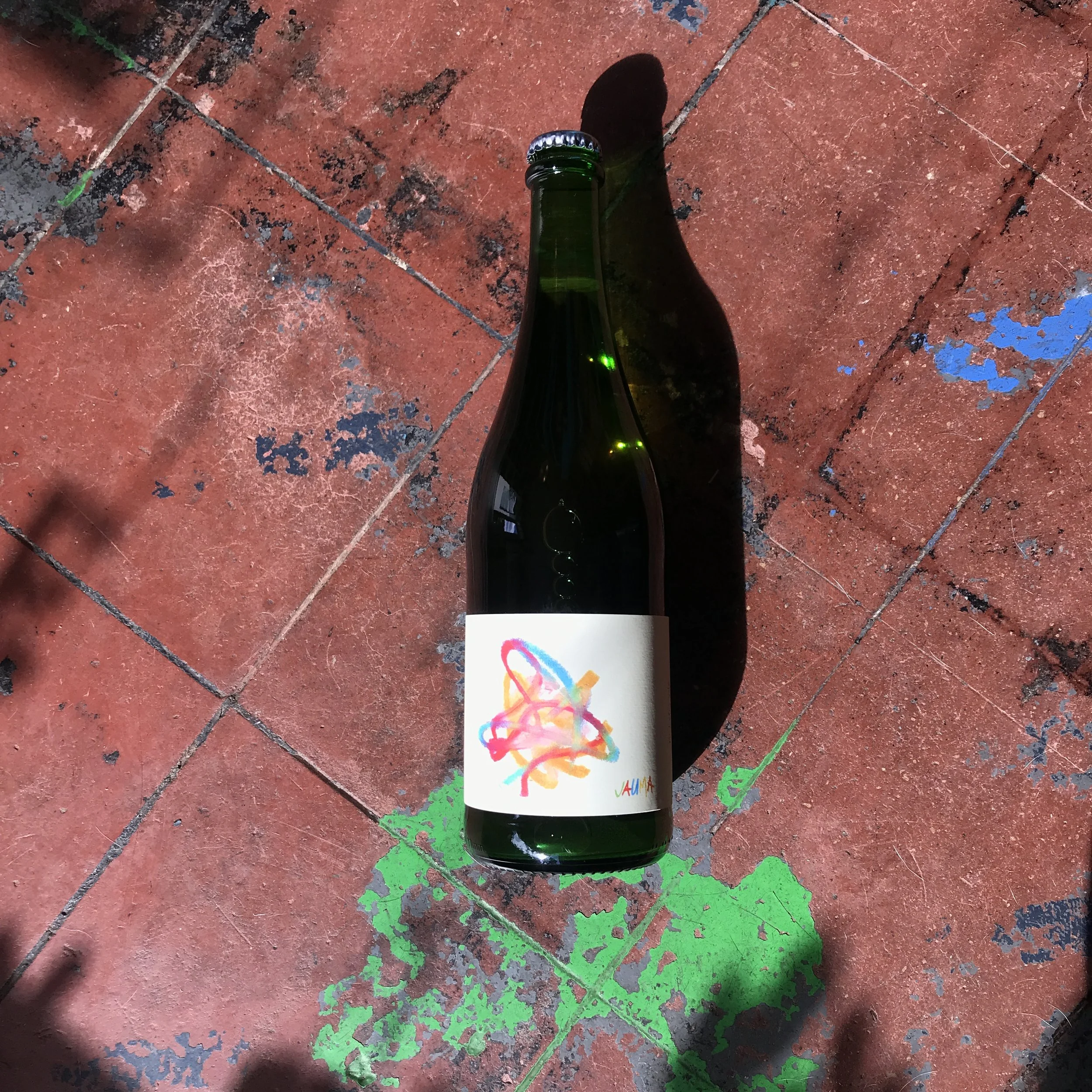Jauma 'Why Try So Hard'
You could say I have a crush on Jauma entirely but for now let’s focus on “Why Try So Hard” cuz I just had a bottle and it f’ing blew my mind!!
James has praise heaped on him but really, I think Denise (his wife), Fiona (farmer extraordinaire), Natalya (permaculture advocate) and their team are the foundation of this amazing estate! Yes, he was a sommelier and yes, he went to Davis but honestly these things can take years to UNDO cuz most of what we learn in those worlds is toxic. It is his commitment to his team, to the land and the pure portrait of a grape, its place in the world and to permaculture that impresses me!
Vineyards are inherently mono-culture so it takes commitment and work to bring balance to a vineyards place in the world. Permaculture helps. And really this just means that they work to increase the biome of the leaf/plant as well as the soil - this allows the vine to fight off any mildew naturally. See the explanation from Jauma below:
“We get our compost for the compost tea sprays from Nat because she is a whizz at building Fungi rich (rather than bacteria rich) composts. When we spray out our compost tea it has usually been brewing for between 18-24 hours and is watched to make sure the brew is building life and especially fungi. This is then sprayed immediately out over the farm and the leaves of the vines and cherries. The idea here is that we are increasing the biome on the leaf area. Traditional organic systems work with sulfur and copper to kill off any fungi/mildews that may attack the leaves. The sulfur and or copper is sprayed roughly every 10 days to cover and protect any new growth. The compost tea hopes to cover the leaf with living organisms so that we can keep building the leaf/plant and soil biome so that when mildew conditions arise (powdery and downy mildew) there are already other fungi and life occupying the spaces where mildew could otherwise attack = just think of it like your gut and gut health. Below ground we are introducing up to 26 different cover/co-crops that exist within the orchards/vineyards. Here there is some recent science which shows once you reach a certain tipping point over e.g. 8 different plants working in the same area you get gene activation of proteins which increase both water use efficiency and disease resistance. So, the usually organic paradigm is to remove as much of the competing/weed growth around the vines/cherries - we are going to try working with a more symbiotic system - wish the plants luck”
All this can sound like hocus pocus/mumbo jumbo so I get the rolled eyes…. thing is when you walk in these vineyards - when you taste these wines there is something so alive, so unique - clean and beautiful that you have to pause and be like WTF?!! This works!
There is also the simple fact that when awesome folks like this back it up with a team that is valued, paid well - just seems obvious to support them and drink all the yummy juice!!
Side note: when you travel all over the world and see that some wineries are doing this across the globe but a lot are not ….. so to visit places like Jauma that are bucking the expected in spite of immense pressure - to allow their little slice of this planet to come into more harmony, it is really just so freaking AWESOME! And when the wine tastes this clean & beautiful - like DUH! Buy it, drink it - you want to!
The name ‘Why Try So Hard’ is a nod to the fact that it’s something different every year….it’s not about pumping out the same thing every year, but about a vibe (hell yes!). For 2020, the crew decided on a blend of Chenin Blanc, Muscat a Petit Grains with a pinch of carbonic-maceration Grenache. Each grape is treated differently soooo here goes….
Chenin is destemmed and pressed directly into a barrel where it ferments for about 10 months.
The Muscat is destemmed and fermented with the skins for 2 weeks. It is then pressed into barrel for 10 months. The Grenache is fermented in a closed stainless steel tank for 2 weeks which causes carbonic maceration where the grapes ferment from the inside out. FUN FACT: for carbonic maceration, the tank is typically sealed with CO2 - here they use the CO2 that is created during fermentation of Chenin rather than pump in CO2 for the carbonic maceration. And not because the other way is wrong-just in an experiment of ‘what if nothing is purchased and we use what we have.’ The result is super aromatic and so lovely and light. Dry, crisp, and perfectly tart. Early summer raspberries and gooseberries with hints of pie cherries-bright and fresh! Balanced and wonderful on so many levels!! Dare I say ‘summer in a glass’? Yes yes, I dare!! Cuz this is BOMB and YUM!

